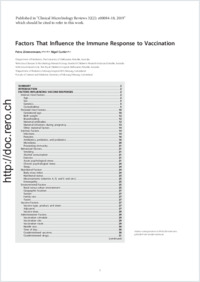Factors that influence the immune response to vaccination
- Zimmermann, Petra Department of Pediatrics, Fribourg Hospital HFR, Fribourg, Switzerland - Faculty of Science and Medicine, University of Fribourg, Switzerland, Department of Paediatrics, The University of Melbourne, Parkville, Australia - Infectious Diseases & Microbiology Research Group, Murdoch Children’s Research Institute, Parkville, Australia - Infectious Diseases Unit, The Royal Children’s Hospital Melbourne, Parkville, Australia
- Curtis, Nigel Department of Paediatrics, The University of Melbourne, Parkville, Australia - Infectious Diseases & Microbiology Research Group, Murdoch Children’s Research Institute, Parkville, Australia - Infectious Diseases Unit, The Royal Children’s Hospital Melbourne, Parkville, Australia
-
20.03.2019
Published in:
- Clinical Microbiology Reviews. - 2019, vol. 32, no. 2, p. e00084-18
English
There is substantial variation between individuals in the immune response to vaccination. In this review, we provide an overview of the plethora of studies that have investigated factors that influence humoral and cellular vaccine responses in humans. These include intrinsic host factors (such as age, sex, genetics, and comorbidities), perinatal factors (such as gestational age, birth weight, feeding method, and maternal factors), and extrinsic factors (such as preexisting immunity, microbiota, infections, and antibiotics). Further, environmental factors (such as geographic location, season, family size, and toxins), behavioral factors (such as smoking, alcohol consumption, exercise, and sleep), and nutritional factors (such as body mass index, micronutrients, and enteropathy) also influence how individuals respond to vaccines. Moreover, vaccine factors (such as vaccine type, product, adjuvant, and dose) and administration factors (schedule, site, route, time of vaccination, and coadministered vaccines and other drugs) are also important. An understanding of all these factors and their impacts in the design of vaccine studies and decisions on vaccination schedules offers ways to improve vaccine immunogenicity and efficacy.
- Faculty
- Faculté des sciences et de médecine
- Department
- Master en médecine
- Language
-
- English
- Classification
- Medicine
- License
-
License undefined
- Identifiers
-
- RERO DOC 324687
- DOI 10.1128/CMR.00084-18
- Persistent URL
- https://folia.unifr.ch/unifr/documents/307702
Statistics
Document views: 128
File downloads:
- pdf: 410
